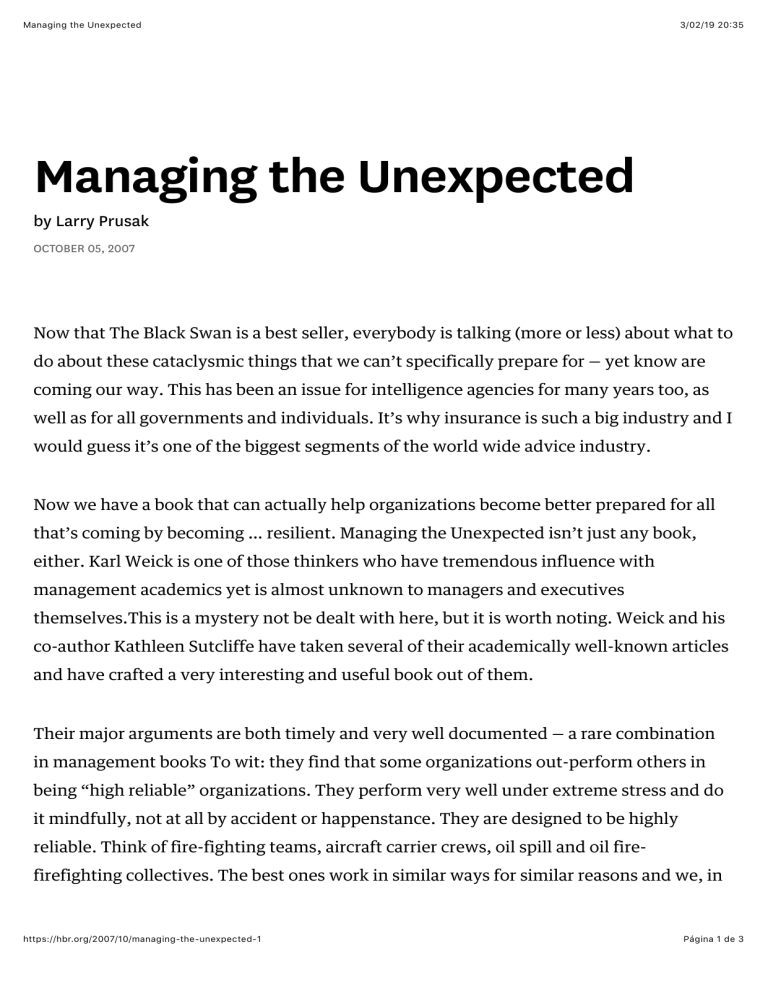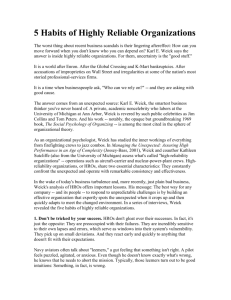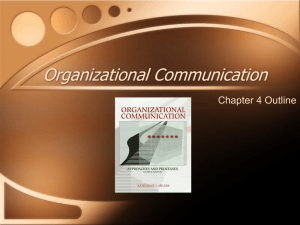
Managing the Unexpected 3/02/19 20(35 Managing the Unexpected by Larry Prusak OCTOBER 05, 2007 Now that The Black Swan is a best seller, everybody is talking (more or less) about what to do about these cataclysmic things that we can’t specifically prepare for — yet know are coming our way. This has been an issue for intelligence agencies for many years too, as well as for all governments and individuals. It’s why insurance is such a big industry and I would guess it’s one of the biggest segments of the world wide advice industry. Now we have a book that can actually help organizations become better prepared for all that’s coming by becoming … resilient. Managing the Unexpected isn’t just any book, either. Karl Weick is one of those thinkers who have tremendous influence with management academics yet is almost unknown to managers and executives themselves.This is a mystery not be dealt with here, but it is worth noting. Weick and his co-author Kathleen Sutcliffe have taken several of their academically well-known articles and have crafted a very interesting and useful book out of them. Their major arguments are both timely and very well documented — a rare combination in management books To wit: they find that some organizations out-perform others in being “high reliable” organizations. They perform very well under extreme stress and do it mindfully, not at all by accident or happenstance. They are designed to be highly reliable. Think of fire-fighting teams, aircraft carrier crews, oil spill and oil firefirefighting collectives. The best ones work in similar ways for similar reasons and we, in https://hbr.org/2007/10/managing-the-unexpected-1 Página 1 de 3 Managing the Unexpected 3/02/19 20(35 more formal organizational settings, can learn from such groups. This is what the authors are bringing us-how to operate more like a wildfire management group then like our boring and low-reliable selves. There are several key points in their prescription. The overriding one is mindfulness. Being very conscious of variations in performance and the environment. Another key principle is avoiding over-simplification. They could have written an entire book on just this one subject, relevant to governments as well as business. A third point, dear to my own research heart, is understanding and taking advantage of rapidly shifting expertise. NASA provides several case studies in how not to do this (though the agency has radically changed its ways recently) All of this is wonderful advice, backed up by deep reading and real grounded examples. A few pages of Karl Weick is more valuable then anything else you will read this week and this short and accessible book is fine place to start learning the Weick stuff. Read all of Larry Prusak’s Now Read This posts. RECOMMENDED READING: The Black Swan: The Impact of the Highly Improbable (Hardcover) Predictable Surprises: The Disasters You Should Have Seen Coming, and How to Prevent Them (Hardcover) Assessing Your Organization’s Crisis Response Plans (Case Note) Larry Prusak is an independent consultant who has co-authored 12 books and many articles. He currently teaches at Columbia University’s MS Program in Information and Knowledge Strategy. https://hbr.org/2007/10/managing-the-unexpected-1 Página 2 de 3 Managing the Unexpected 3/02/19 20(35 Comments Leave a Comment POST 0 COMMENTS JOIN THE CONVERSATION POSTING GUIDELINES We hope the conversations that take place on HBR.org will be energetic, constructive, and thought-provoking. To comment, readers must sign in or register. And to ensure the quality of the discussion, our moderating team will review all comments and may edit them for clarity, length, and relevance. Comments that are overly promotional, mean-spirited, or off-topic may be deleted per the moderators' judgment. All postings become the property of Harvard Business Publishing. https://hbr.org/2007/10/managing-the-unexpected-1 Página 3 de 3

